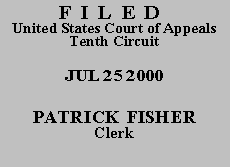

| KENNETH RAY MEYER,
Petitioner-Appellant, v. GEORGE HERMAN, Warden, Arizona State Penitentiary; DREW EDMONDSON, Respondents-Appellees. |
|
Before petitioner can proceed on appeal, he must obtain a certificate of appealability from this court, which requires "a substantial showing of the denial of a constitutional right." 28 U.S.C. § 2253(c)(2). Unfortunately, we cannot review any of petitioner's claims because petitioner, who is represented by retained counsel, has failed to provide us with an adequate record. "This Court will decline to consider a claim in the absence of the appropriate documents in the record on appeal, since any discussion of such a claim would be speculation." United States v. Vasquez, 985 F.2d 491, 494 (10th Cir. 1993).
Petitioner's counsel is responsible for filing an appendix "sufficient for considering and deciding the issues on appeal." 10th Cir. R. 30.1(A)(1). In particular, Tenth Circuit Rule 10.1(A)(1) requires that the appendix contain "all portions of the transcript necessary to give the court a complete and accurate record of the proceedings related to the issues on appeal," and "[w]hen sufficiency of the evidence is raised, the entire relevant transcript must be provided," id. 10.1(A)(1)(a). It is counsel's responsibility to provide us with an adequate record for our review, and we are under no obligation to remedy counsel's failure to do so. See Deines v. Vermeer Mfg. Co., 969 F.2d 977, 979 (10th Cir. 1992).
The appendix filed by petitioner's counsel does not contain a copy of the trial transcript.(2) "[T]he failure to file a trial transcript precludes review of a conviction for sufficiency of the evidence. By failing to file a copy of the trial transcript as part of the record on appeal, the appellant waives any claims concerning the sufficiency of the evidence at trial." Vasquez, 985 F.2d at 495.
Likewise, we cannot review petitioner's claim for ineffective assistance of trial counsel without a trial transcript. To establish a claim of ineffective assistance, petitioner must show both that his counsel's conduct fell below an objective standard of reasonableness and that this deficient conduct prejudiced petitioner. See Strickland v. Washington, 466 U.S. 668, 687 (1984). To establish prejudice, "[t]he defendant must show that there is a reasonable probability that, but for counsel's unprofessional errors, the result of the proceeding would have been different." Id. at 694. In the absence of a transcript, we cannot judge whether trial counsel's failure to object to the second degree murder jury instruction was either erroneous or prejudicial. See King v. Unocal Corp., 58 F.3d 586, 587-88 (10th Cir. 1995) (ruling that court could not consider challenge to jury instruction without complete trial transcript). Nor can we ascertain whether petitioner was prejudiced by trial counsel's failure to investigate and present certain evidence at trial.
Finally, in the absence of a trial transcript, we cannot determine whether a cumulation of alleged errors affected petitioner's substantial rights so as to make his trial fundamentally unfair. Cf. Allen v. Minnstar, Inc., 97 F.3d 1365, 1372-73 (10th Cir. 1996) (concluding that even if trial court committed error, appellate court could not determine that error affected plaintiff's substantial rights in absence of trial transcript).
In light of petitioner's failure to provide an adequate record for our review, he has not made a substantial showing of the denial of a constitutional right. Therefore, we DENY petitioner a certificate of appealability and DISMISS the appeal. The mandate shall issue forthwith.
Entered for the Court
Circuit Judge
*. This order and judgment is not binding precedent, except under the doctrines of law of the case, res judicata, and collateral estoppel. The court generally disfavors the citation of orders and judgments; nevertheless, an order and judgment may be cited under the terms and conditions of 10th Cir. R. 36.3.
1. After examining the briefs and appellate record, this panel has determined unanimously that oral argument would not materially assist the determination of this appeal. See Fed. R. App. P. 34(a)(2); 10th Cir. R. 34.1(G). The case is therefore ordered submitted without oral argument.
2. The record reflects that the district court had a copy of the trial transcript, which it relied on in its ruling.